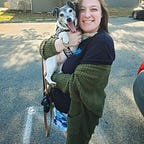Fat Is Not A Bad Word
My path to body neutrality
I was sitting on the couch in my parents’ living room speaking with my father about something I saw on Twitter. I described that Donald Trump Jr. was fat-shaming a congresswoman by claiming the reason she got Covid was because she was fat.
When I said that, “she’s fat,” my mother stopped cooking dinner and snapped her head up. “What did you just say?” she asked, clearly stunned by my words.
“I said she’s fat and Don Jr. is a piece of crap by making her feel bad about it,” I replied. My moms eyes remained wide, so I added “Fat isn’t a bad word, Mom.”
“I know, I know,” she mumbled and went back to making dinner.
The first time I thought I was fat was in 5th grade. I couldn’t fit into clothes from The Children’s Place anymore so I started shopping at stores in the mall like Aeropostale. I wore a size 0 and weighed about 100 lbs. I was also the tallest kid in my class at just over five feet tall. All of my girlfriends in class were still in kids clothes and weren’t yet wearing bras. I figured that must mean I was fat.
The first time someone called me fat was in 6th grade, when a mean boy bumped into me walking past me in the hallway. “Move out of the way, you fat lard,” he spat at me. I was taken aback and didn’t even have time to react before his friends laughed. I brushed it off, thinking he was just a dick and didn’t mean it.
The first time I knew I was fat was in 10th grade when I had the option to take a different gym class than the regular curriculum. My high school offered courses like aerobics and weight lifting. I took aerobics because my friends and I thought it would be better than regular gym class. On the first day we made goals for ourselves to meet by the end of the year. Most of the girls in my class set the goal of “lose weight,” “fit into this dress,” or “go down a size.” I felt out of place because my goals were “eat healthier, feel better, and have more energy.” I felt stupid compared to my peers for not prioritizing my size.
The first time I knew I wanted to stop being fat was in 2018 when I suffered a manic episode that landed me in a psych hospital. I was the heaviest I had ever been and was suffering from pretty intense sleep apnea. I wanted to physically and mentally feel better. I wanted to sleep better. So I took action to make that happen by joining Weight Watchers.
The first time I knew I wanted to quit losing weight was in 2020 when I lost my job due to Covid. It didn’t feel important anymore to continue losing weight and paying for a service that I wasn’t able to continue using consistently. So I cancelled my membership, but continued to live by the goals I had set and live by the rules I had followed. It wasn’t sustainable.
The first time I decided to practice body neutrality was just a few months ago when I came across a woman my age on Tik Tok who ate her lunch every day wearing a bikini, while talking about her day. She spoke about body neutrality and how we all needed to unlearn our fatphobia that we are taught from a young age.
Body neutrality is about accepting that words like “fat” and “slim” are not descriptions of you as a person, but rather descriptions of your body. They are inherently neutral words. “Fat” doesn’t mean “that is a bad person because they look like this.” It means “that person has fat.” Every person has fat. Some people just have more than others. It’s neither good nor bad. It just is.
It’s taken me several months to even be comfortable with viewing my body neutrally. I don’t look at my body as “good” or “bad;” I look at my body in regards to what it can do. My body is strong. My body is soft. My body has a heart that pumps blood to my organs and keeps me alive. My body grows hair. My body is a body and that is enough.
My body is the least interesting thing about me. My brain, my hobbies, my interests, my sense of humor are all far more interesting and make me who I am far more than how much fat I have on my body.
I lost over 50 lbs while on Weight Watchers by restricting food and lying to myself about what was good food and what was bad food. While I don’t regret losing weight because I no longer have sleep apnea and I am more comfortable day-to-day, I do regret losing it the way that I did. I was given tools that were designed to perpetuate eating disorder culture disguised as “body positivity” and “self love.”
My body is a vessel that allows me to do amazing things, feel emotions, accomplish tasks, and do what I love. I am not what I look like. Every body is good because it houses a person, not because it fits into the BMI scale.
I can love my body for what it does rather than how it looks. There is still acceptance in body neutrality, but based primarily on acknowledging what a body does instead of how it looks.
Fat is not a bad word.
